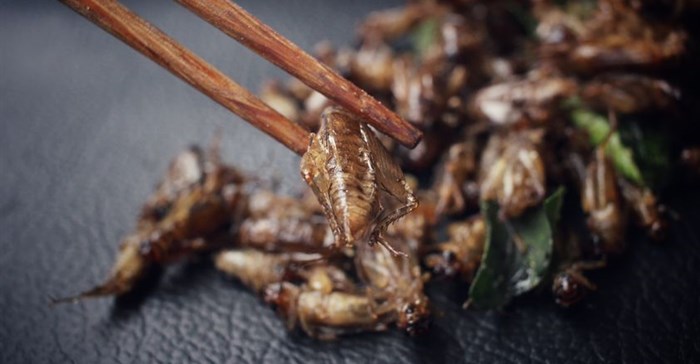Bugger that: food that chirps

Crickets, in particular, are full of protein and, if the UN organisation realises its dreams, will soon become the solution to one of the world's biggest food problems - the global population outpacing the ability to distribute food.
Two billion people worldwide already eat 2,000 species of insects. Locally, termites are sometimes served with maize porridge. You can get spicy grasshopper tacos in Mexico. In Indonesia, dragonflies boiled in coconut milk are a delicacy. In the Democratic Republic of Congo, caterpillars are traditional eating. And in the US, cricket protein is added to energy bars, biscuits, desserts and snacks.
Substituting animals with bugs
The organisation's research claims that by replacing the livestock that we farm for protein with edible bug products we can reclaim as much as 30% of the earth's land from the traditional livestock farming industry, global greenhouse gas emissions could be reduced by as much as 18%, and food prices in most countries could be slashed by 30%. The plan is to start small, initially merely supplementing meat and animal feed with bug products.
Vantomme thinks that, in the US, within 20 years 10% of animal feed could be insect-derived.
Livestock farming is resources hungry and a huge contributor to climate change. One-third of all grains produced worldwide are grown to feed animals in the intensive farming of cattle, pig, fish, and poultry. "Liberating those grains for direct human consumption by using insects as animal feed would free more food for humans," Vantomme said.
Farming for insects
And teaching humans to eat crickets instead of beef, pork, fish, and fowl would drastically decrease the effect of livestock on climate change and give the poor better nutrition. A basic home insect farm - a lidded container filled with peat moss, a pack of crickets, corn meal feed, and a wet sponge to keep the bugs hydrated is all that's needed.
In an interview last year with Food Republic, Kyle Connaughton, creator of Exo cricket-flour-based energy bars, said the crickets he raised had "virtually no effect on their surroundings". Crickets and other bugs feed on organic material and waste - fabric, paper, other insects, decaying plants, human and animal waste, even old cat food - lessening the amount of rubbish going into landfills.
Further study needed
But entomology professor, Tom Turpin, at Purdue University, in the US, said no one has yet tackled insect production on a scale that would match traditional protein production. Researchers have found that the tighter crickets were packed into farms, the less protein they produced.
Furthermore, not enough research has been completed to determine the long-term effects of feeding bugs to animals. Early reports by the Food and Agriculture Organisation show promising results: the larvae of black soldier flies, grown in pig manure, can digest it and ultimately reduce its volume; chicks fed black soldier fly larvae meal gained weight. But further study is needed.
Insects are particularly susceptible to contamination, Turpin said. Crickets raised on food scraps and manure could suffer from fungus, bacteria, drug, or metal contamination - and we wouldn't know until we ate them and got sick.
The biggest obstacle to realising the crickets-as-food fantasy might be convincing non-insect-eaters that things are dire enough to consider trading in their prime rib for cricket burgers. - © Lucky Peach Magazine
Source: The Times
Source: I-Net Bridge

For more than two decades, I-Net Bridge has been one of South Africa’s preferred electronic providers of innovative solutions, data of the highest calibre, reliable platforms and excellent supporting systems. Our products include workstations, web applications and data feeds packaged with in-depth news and powerful analytical tools empowering clients to make meaningful decisions.
We pride ourselves on our wide variety of in-house skills, encompassing multiple platforms and applications. These skills enable us to not only function as a first class facility, but also design, implement and support all our client needs at a level that confirms I-Net Bridge a leader in its field.
Go to: http://www.inet.co.za



























